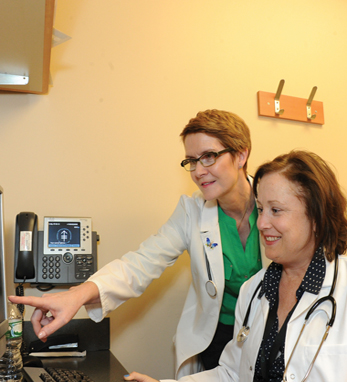
Anne Kelly and Maryellen O’Sullivan
Nurses were Ireland’s biggest export in the late 1980s when Anne Kelly finished her five years of training, first as a nurse and then as a midwife. “The job situation at home was bad and everyone was going somewhere else,” she recalls. Anne herself was recruited to come to New York City in 1987 from Kilconnell, Co. Galway, to work at Memorial Sloan-Kettering Cancer Center but it wasn’t her first time working outside Ireland. Earlier, Anne had the opportunity to spend 10 months as a midwife in Saudi Arabia, Anne credits her successes to her nursing studies at University Hospital, Galway, where the nuns were in charge. “Wherever we go, our training has stood to us,” she notes. “It’s in us to do the best we can for every patient. I think Irish nurses get on very well everywhere.
“I’m no Mother Teresa,” she admits, “It’d always be in my head: How could I help the patient more? I think it’s in our DNA as Irish people to be kind, to go that extra mile. “It’s very important,” Anne says, “and the patients feel it. They know we’re on their side. It might mean taking a few extra minutes but we try to pick up on little things. Often, when you talk to a patient, you hear the worry in their voice and you try to find out what specifically is causing that concern.”
Maryellen O’Sullivan, whose grandparents came from Tipperary and Kerry, received her Bachelor’s degree in nursing from Wagner College and an advanced practice degree from NYU. As a nurse leader at Memorial Sloan-Kettering Cancer Center’s Sidney Kimmel Center for Prostate and Urologic Cancers, Maryellen has about five nurses on her staff who were trained in Ireland and also works with many nurses of Irish descent.
In comparing the approach of Irish nurses in greeting patients and doing assessments, Maryellen has observed that culturally, “they tend to have a softer, more engaging style and use some humor, which makes patients feel more at ease.” Even the Irish accent can sometimes be a nice talking point that patients enjoy picking up on, she adds. “In a big institution, if you can humanize the experience and make personal connections, it’s very helpful.”
During the more than 25 years that Maryellen has been in nursing, she has seen the first wave of Irish nurses who arrived in the 1980s and a second wave in the last 10 years, as more people returned to the workforce after a break to raise children or do other things. Maryellen reports that Irish nurses “have a strong history of being extremely well schooled and competent, very hard workers and exceptionally dependable.”
Technology has become much more of a presence in nursing today, Maryellen says, but the “key thing is meaningful use of technology and while it can be a learning curve for some people, it doesn’t take away from their ability to do a nursing assessment or to develop an individual plan of care.” No matter what the specialty or sub-specialty, Irish nurses have demonstrated their abilities to bridge the old and new worlds with grace, good humor and ability.
– By Teresa O’Dea Hein
